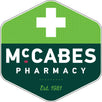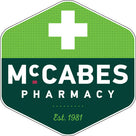Explaining different types of face masks: ingredients to look for and how often you can use them
Face masks are a great way to pamper the skin while providing an opportunity to relax. This section will explain the benefits of the different popular types of face masks, covering what they are designed for and how often they can be used. We will also advise you on the ingredients to look for in effective face masks for your skin type, featuring recommended products for each type of mask.
Click on a link to jump to that section:
- Cleansing face masks
- Who are cleansing face masks suitable for?
- Ingredients to look for
- Using charcoal and clay masks
- Anti-ageing face masks
- Who are anti-ageing face masks suitable for?
- Ingredients to look for
- Anti-ageing face masks for different purposes
- Sheet face masks
- Who are sheet face masks suitable for?
- Ingredients to look for
- Recommended sheet masks
- Hydrating face masks
- Who are hydrating face masks suitable for?
- Ingredients to look for
- Recommended hydrating masks
Deep cleansing face masks
Who are cleansing face masks suitable for?
Cleansing face masks are effective for treating acne-prone skin, removing dead skin cells and unclogging pores. Clay and charcoal are popular types of face masks, as they are effective in removing toxins and oil from the skin.
Ingredients to look for in cleansing masks
- Activated charcoal
- Clay
- Kaolin
- Glycerin
- Panthenol
Below is a guide to using charcoal and clay face masks to cleanse the skin:
Charcoal face masks
Who are charcoal masks suitable for?
Charcoal is extremely effective at drawing chemicals and toxins out of the skin. The people who will see the greatest benefit from charcoal face masks are those with oily skin. If you have very dry skin and use charcoal masks frequently, you may find that a charcoal face mask causes your skin to dry out as the activated charcoal absorbs moisture.
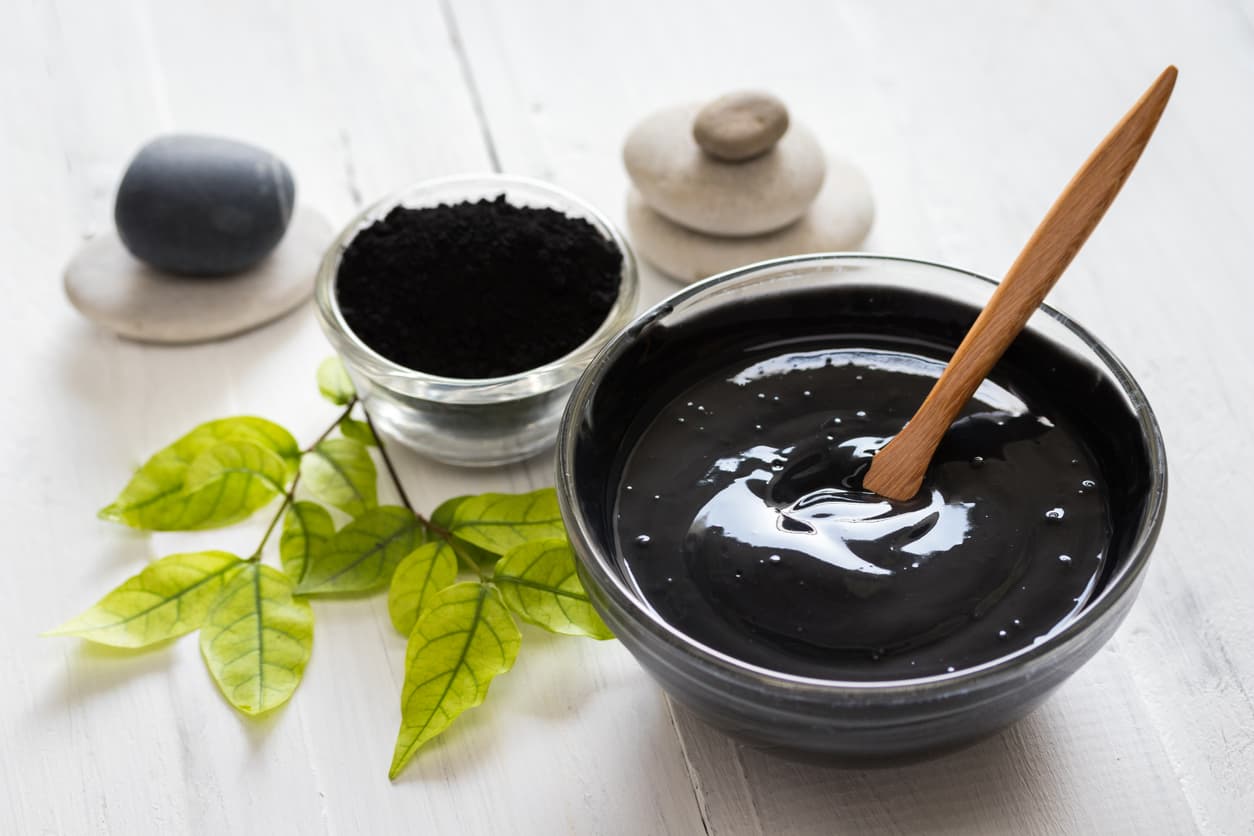
For more guidance on charcoal masks, read our guide on How to apply charcoal masks and the different types available.
How often can I apply a charcoal mask?
For most people, applying a charcoal face mask twice a week will be plenty to keep issues with oil and impurities under control. If you have particularly oily skin, it may be necessary to use it a maximum of 3-4 times per week.
Recommended products
7th Heaven Charcoal Mask
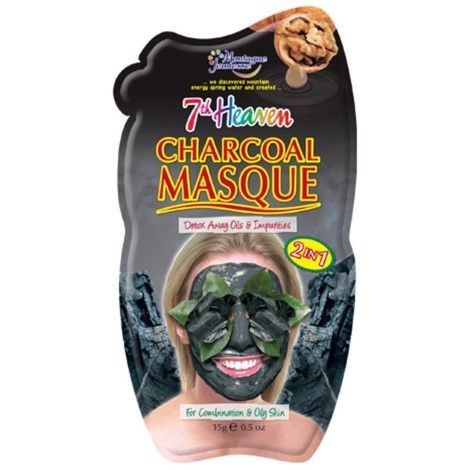
Get squeaky clean skin & remove impurities with the powerful 7th Heaven Charcoal Face Mask.
Biovene Bubble Mask
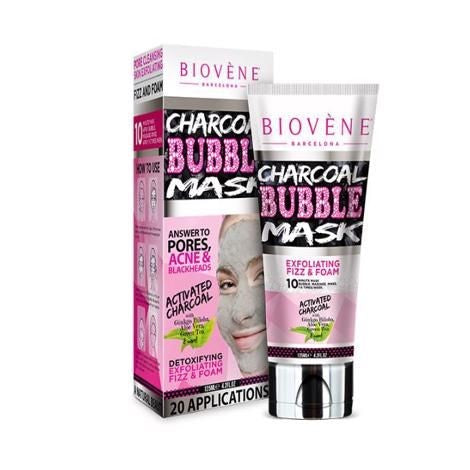
- Infused with oxygen to help the natural key ingredients dive deep into the skin
- Watch as bubbles foam and fizz
- Removes excess dirt and cleanse pores
Vichy Clarifying Detox Charcoal Mask 75ml
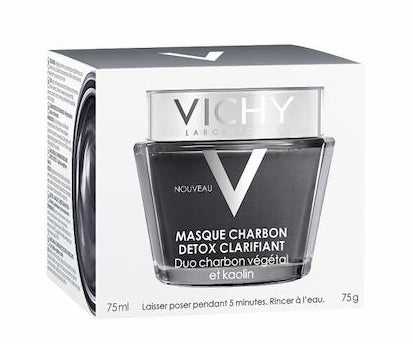
- Deep pore cleansing from toxins, dirt and pollution
- Revives skin exhausted by the environment
- Results in just 5 minutes
- Mineralizing Thermal Water leaves the skin feeling invigorated
Clay face masks
Who are clay masks suitable for?
Like charcoal and mud masks, clay masks are known for their ability to unclog pores and reduce shine. Clay face masks can be used for a range of skin concerns, such as blackheads, acne breakouts, oily skin and reducing the appearance of pores. They are particularly ideal if you have oily skin, and should avoided by those with very dry skin.
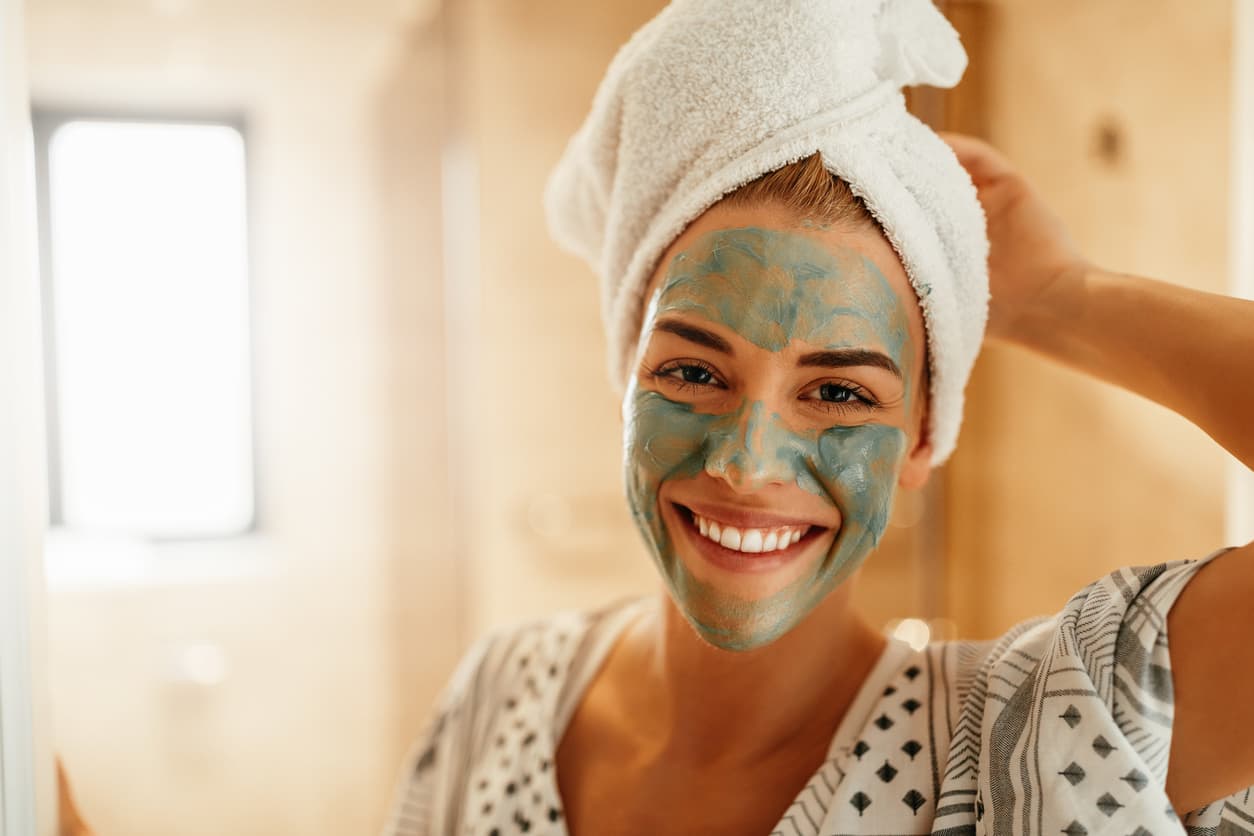
Recommended products
Loreal Pure Clay Glow Mask
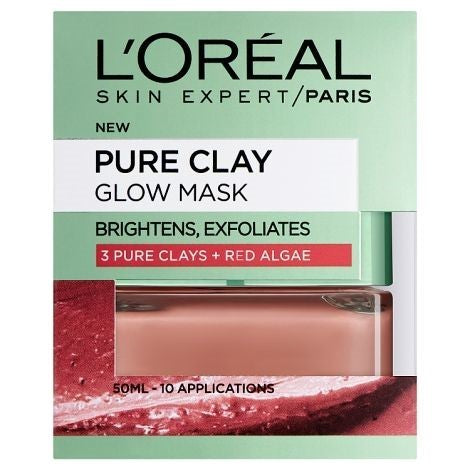
- Enriched with Red Algae extract
- Creamy texture
- Illuminating formula
- Exfoliating mask
- Contains beads
- Relaxing fragrance
Loreal Paris Pure-Clay Purity Mask 50ml
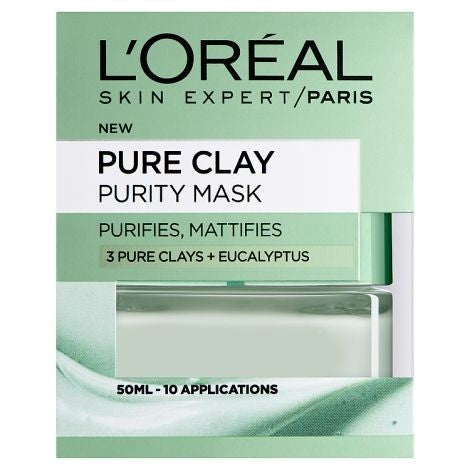
- Enriched with Eucalyptus Extract
- Creamy texture
- Works deep into your pores
- Does not dry out the skin
- Creates matte-looking skin
- Relaxing fragrance
Beauty Formulas Charcoal Clay Mask 100ml
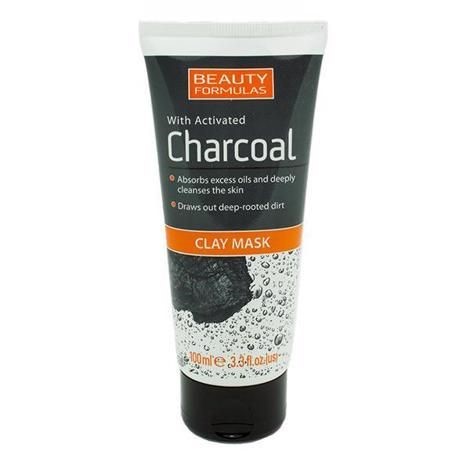
- Draws out dirt & impurities
- Purifies pores
- Leaves skin looking radiant
- Enriched with natural kaolin clay, glycerin and activated charcoal
How often can clay face masks be used?
Clay masks should ideally be used no more than three times per week, unless you particularly oily and shiny skin.
You can read our full guide to using clay face masks here.
Anti-ageing face masks
Who are anti-ageing masks suitable for?
Anti-ageing face masks are suitable for treating various signs of ageing, including wrinkles, fine lines, dull skin and dark spots.
Ingredients to look for
As anti-ageing face masks differ in their overall goal, there are numerous ingredients to look for, depending on your main concern:
- Collagen and adenosine - collagen is effective in keeping the skin smooth, combatting wrinkles. Adenosine energises the skin’s surface, decreasing the appearance of wrinkles
- Vitamin C- an antioxidant, vitamin C helps repair skin damage
- Retinol - this active ingredient helps to boost the skin’s collagen levels
- Green tea - antioxidants such as green tea help to brighten the skin and improve a dull skin tone
Recommended products
Neutrogena Radiance Boost Hydrogel Recovery Mask 30ml
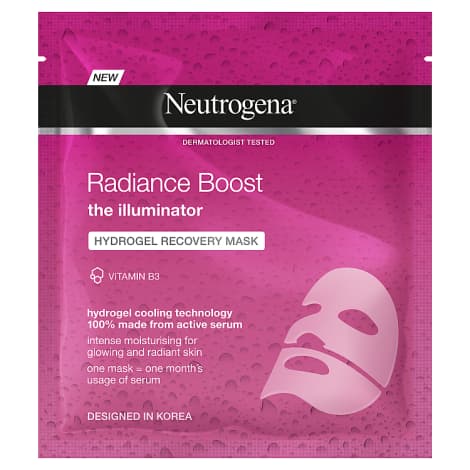
- Dermatologist tested
- The illuminator
- Vitamin B3
- Hydrogel cooling technology
- 100% made from active serum
- Intense moisturising for glowing and radiant skin
- One mask = one month's usage of serum
Garnier Moisture Bomb Green Tea Hydrating Face Sheet Mask
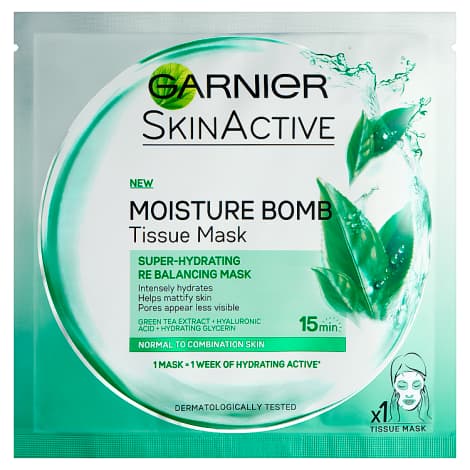
- Super-hydrating
- Re-balancing mask that intensely hydrates, mattifies skin and makes pores appear less visible
Nivea Q10 Power Firming Sheet Mask
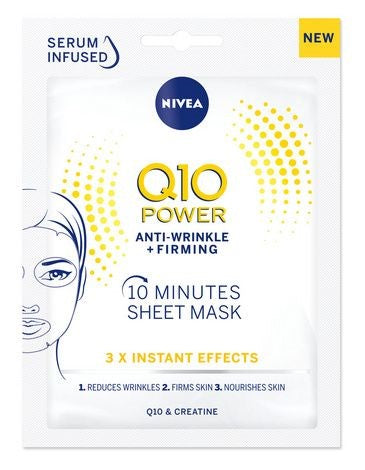
- With a powerful combination of Q10 and Creatine
- Provides a firmer skin feeling
- 10-minute sheet mask
- Biodegradable fibre mask
- Super soft sheet mask and easy to fit
How often should I use an anti-ageing face mask?
Hydrating masks can be used roughly twice a week but exfoliating, brightening or anti-ageing masks should be used between 1-2 times a week.
You can read more about using anti-ageing face masks here.
Face mask sheets
Who are face mask sheets suitable for?
Face mask sheets can be used for a variety of skin concerns, such as acne, dry skin, or irritated skin. They are most commonly designed for hydrating the skin, as face mask sheets can quickly provide the skin with a burst of moisture. They are ideal for you if you want a mess-free, quick application of a face mask formula.
Recommended products
Garnier Skin Active Moisture Bomb Tissue Mask
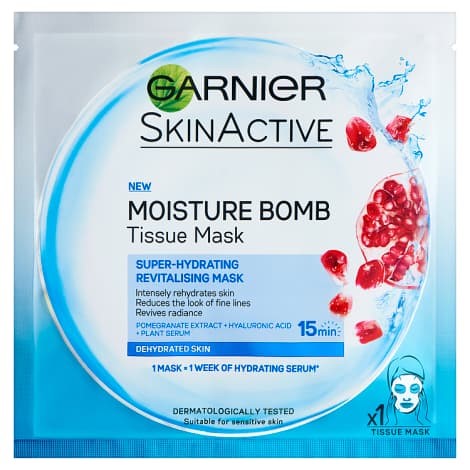
- Replumps & soothes skin
- Enriched with hyaluronic acid
- Reduces the look of fine lines
Garnier Skin Active Moisture Bomb Hydrating Mask
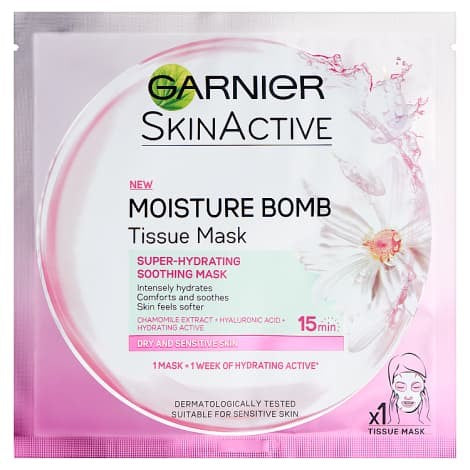
- A soothing mask that intensely hydrates, comforts and soothes
- Skin feels softer
Garnier Skin Active Pure Charcoal Mask
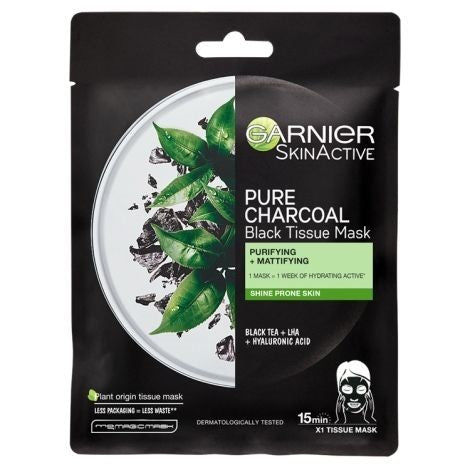
- Garnier pure charcoal sheet mask - a super purifying and mattifying mask for skin prone skin
- The no1 sheet mask brand to intensely rehydrate, purify and refresh shine prone skin
- An efficient and convenient solution to purify skin without drying it out
- Skin looks clearer and healthier
Read our full guide to using face mask sheets here.
Hydrating face masks
Who are hydrating face masks suitable for?
Hydrating masks will moisturise your skin and help it to look its best. They are also effective as an occasional treatment before a special event or in warm weather, which can dry out the skin. Choose your hydrating face mask carefully if you are prone to oil or shine, to avoid making it more oily. Popular hydrating masks include gel masks and sheet masks.
Ingredients to look for
Look for the following ingredients when finding a hydrating mask:
- Chamomile
- Hyaluronic acid
- Green tea and black tea
- Vitamin C
Recommended products
Neutrogena Ageless Boost Hydrogel Recovery Mask
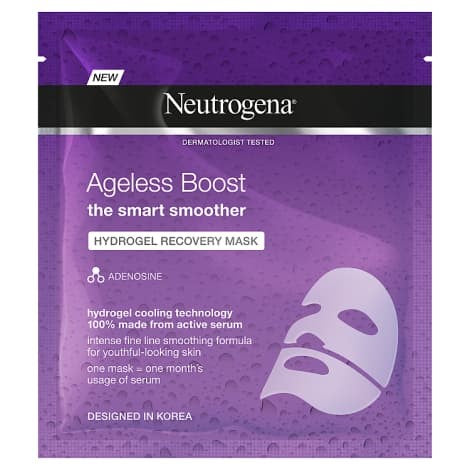
- Contains adenosine
- Non-comedogenic (doesn’t clog pores)
- Suitable for use on sensitive skin
- Dermatologist tested
Embryolisse Hydra Mask
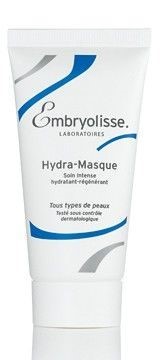
- This moisturising cream mask bathes the skin in moisturising and regenerating active ingredients that plumps in just minutes
- Hyaluronic acid, natural Sesame & Sweet Almond plant oils, and vitamins (A, E and F) regenerate the skin's barrier, smooth the skin, and ensure an optimal level of moisturising
- The skin looks plumper and more toned; it is soft and smooth, and the complexion is fresh and radiant
Montagne Jeunesse 7th Heaven Cucumber Peel-Off Mask
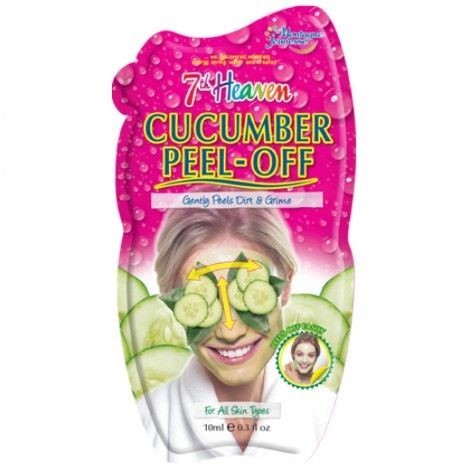
- For normal, oily and t-zone skin types
- Easy to use
- Contains Cucumber extracts
- Gently peels away dead skin cells
How often can I apply a hydrating face mask?
If you feel your skin needs a lot of hydration, then two to three times a week is a good routine for dry or combination skin. If you’re using a hydrating face mask that is also exfoliating, use them no more than twice a week to avoid irritation. If you have very oily skin, you should avoid using hydrating masks frequently. A clay mask or charcoal mask may be more suitable to prevent excess oil.
Read our full guide to choosing hydrating face masks here.
